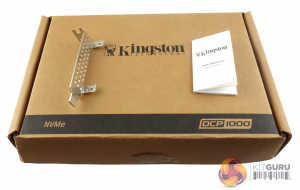
As it's a drive aimed at the Enterprise market segment, it comes as no surprise to find that the DCP1000 ships in a pretty plain brown box with just Kingston's branding on it, the drive name in the bottom right with a NVMe logo on the other side.
All that's in the box is a standard length PCI bracket (we swapped it out for the short one that comes attached to the drive, which is the one you can see on the box) and a tiny installation guide.
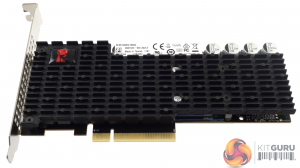
The DCP-1000 is built on an HHHL (half-height, half-length) format PCB measuring 168 x 69 x 18 mm. Practically all of the PCB is covered by a passive heatsink, the only part of the board not covered is where the nine power capacitors sit. These provide hardware data loss protection against power failure.
We haven't taken the drive apart to photograph the internals as we hope to do some further testing with it and didn't want to risk upsetting the thermal properties of the drive.
Looking after Kingston's SSDs is their SSD Manager utility.
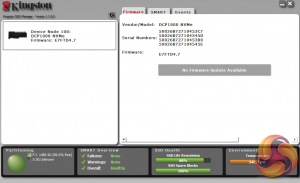
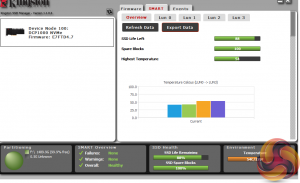
Compared to some of its rival's it's a very simple affair. It supports firmware upgrades for the drive and the S.M.A.R.T section has a useful temperature readout.
 KitGuru KitGuru.net – Tech News | Hardware News | Hardware Reviews | IOS | Mobile | Gaming | Graphics Cards
KitGuru KitGuru.net – Tech News | Hardware News | Hardware Reviews | IOS | Mobile | Gaming | Graphics Cards


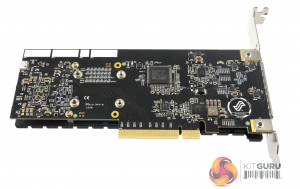
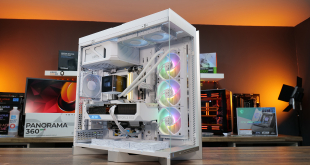
Would it be possible to do game load times in benchmarks? Some engines, e.g. Frostbite, REDengine, RAGE, are extremely impacted by SSD/HDD performance so it’d be great to see how much of an impact such a product has on loading times.
What is the MTBF for this drive? Given the read write times. Normal day to day and say video editing on a daily basis?
“Stated endurance for the 1.6TB drive as a whole is 1820TB TBW with each of the 400GB drives rated at 375TB TBW”
Depends how much you write per day. 100GB/day would give an estimated 18200 days. 1TB/day would give an estimated 1820 days.
I’ve got a 950 Pro for close to 2 years, that’s now hit 40TB written (rated 400TBW), it’s used as a buffer drive for recordings, temp drive, and to store games on.
I’ve also got a 960 Evo, had it for about a year, is only used for OS and smaller apps like office / photoshop etc, that’s now at 6.8TB written, (rated 100TBW).
Edit: also both drives have only gone down to 99% drive life remaining according to SMART, despite having used 10% and 6.8% of their rated writes. Google the ssd endurance test, some drives almost made 2000 TBW before failing outright, and thats a few years old.
Edit edit: have a look at this;
http://www.guru3d.com/news-story/endurance-test-of-samsung-850-pro-comes-to-an-end-after-9100tb-of-writes.html
That would be interesting to see, especially with comparisons against other drives in similar raid arrays as this raid on card